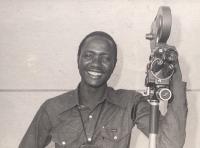 He tells us about the important and complex mission that Amílcar Cabral delegated to them and what it was like to learn the crushing news of his assassination in the middle of this process. It fell to him as his first job to film Amílcar Cabral at an exhibition on the struggle in Conakry, in 1972, and then the transferring of his body to Bissau, capturing the commotion of the Guineans at the death of their greatest thinker and anti-colonial resistance leader.
He tells us about the important and complex mission that Amílcar Cabral delegated to them and what it was like to learn the crushing news of his assassination in the middle of this process. It fell to him as his first job to film Amílcar Cabral at an exhibition on the struggle in Conakry, in 1972, and then the transferring of his body to Bissau, capturing the commotion of the Guineans at the death of their greatest thinker and anti-colonial resistance leader.
Face to face
17.03.2025 | by Marta Lança
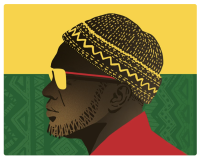 This year marks the 50th anniversary of the Portuguese Revolution and the centenary of the birth of one of the most influential leaders of the African decolonization movement. Transatlantically, Cuba played an important part militarily and politically in ejecting the colonizers, while Brazilian educator Paolo Freire was influenced by Cabral’s education for the people. Their ideas are very relevant today.
This year marks the 50th anniversary of the Portuguese Revolution and the centenary of the birth of one of the most influential leaders of the African decolonization movement. Transatlantically, Cuba played an important part militarily and politically in ejecting the colonizers, while Brazilian educator Paolo Freire was influenced by Cabral’s education for the people. Their ideas are very relevant today.
To read
10.09.2024 | by Graham Douglas
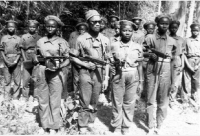 It is February 1964—one year into the armed struggle for independence in Guinea Bissau against Portuguese colonial rule. Cabral, the independence struggle’s leader, had called a conference in Cassaca for his African Party for the Independence of Guinea and Cape Verde (PAIGC) fighters to re-organize and address inter-party grievances.
The Cabral as seen in this and similar photographs, with his defiant stance, dark glasses, and signature knitted stocking cap in spite of the West African heat, would become the iconic image of the West African country. More than fifty years later, the image is still used to signify both Guinea Bissau’s victory in the 11-year independence struggle and the country’s continued hopes for the future. But what about the faces of the young women surrounding the independence hero? Directly to Cabral’s left in the image stands a round-faced, then 14-year old girl, Joana Gomes.
It is February 1964—one year into the armed struggle for independence in Guinea Bissau against Portuguese colonial rule. Cabral, the independence struggle’s leader, had called a conference in Cassaca for his African Party for the Independence of Guinea and Cape Verde (PAIGC) fighters to re-organize and address inter-party grievances.
The Cabral as seen in this and similar photographs, with his defiant stance, dark glasses, and signature knitted stocking cap in spite of the West African heat, would become the iconic image of the West African country. More than fifty years later, the image is still used to signify both Guinea Bissau’s victory in the 11-year independence struggle and the country’s continued hopes for the future. But what about the faces of the young women surrounding the independence hero? Directly to Cabral’s left in the image stands a round-faced, then 14-year old girl, Joana Gomes.
Games Without Borders
04.02.2021 | by Ricci Shryock
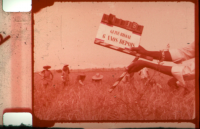 This article reads Amílcar Cabral’s much under-studied early soil science as a body of work not dissociable from his project of liberation struggle against Portuguese colonialism in Guinea-Bissau and Cape Verde. Drawing on research situated within an artistic practice, the article explores the definitions of soil and erosion that Cabral developed as an agronomist, as well as his reports on colonial land exploitation and analysis of the trade economy, to unearth his double agency as a state soil scientist and as a ‘seeder’ of African liberation.
This article reads Amílcar Cabral’s much under-studied early soil science as a body of work not dissociable from his project of liberation struggle against Portuguese colonialism in Guinea-Bissau and Cape Verde. Drawing on research situated within an artistic practice, the article explores the definitions of soil and erosion that Cabral developed as an agronomist, as well as his reports on colonial land exploitation and analysis of the trade economy, to unearth his double agency as a state soil scientist and as a ‘seeder’ of African liberation.
Afroscreen
28.02.2019 | by Filipa César
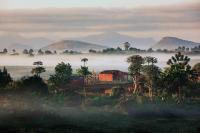 For many young people today, in Cape Verde, Guinea Bissau, Portugal, France, Brazil, the United States of America, Cabral represents the possibility of criticizing various forms of power, of resistance and of affirming their identities. The ways that Cabral has been taken up confirm that the originality of his praxis lies in its articulation of, and opposition to, different dimensions of domination and violence, from neo-colonialism to gender discrimination.
For many young people today, in Cape Verde, Guinea Bissau, Portugal, France, Brazil, the United States of America, Cabral represents the possibility of criticizing various forms of power, of resistance and of affirming their identities. The ways that Cabral has been taken up confirm that the originality of his praxis lies in its articulation of, and opposition to, different dimensions of domination and violence, from neo-colonialism to gender discrimination.
To read
04.08.2018 | by Sílvia Roque
 The book has received critical acclaim as a work by an African writing soberly on “such things”, in “journalistic language, backed by rigorous research.” It is a first in terms of its internal discourse, since it provides us “with a view of an African thinker and fighter from an African perspective."
The book has received critical acclaim as a work by an African writing soberly on “such things”, in “journalistic language, backed by rigorous research.” It is a first in terms of its internal discourse, since it provides us “with a view of an African thinker and fighter from an African perspective."
Face to face
18.09.2010 | by Marta Lança
 In fact, to take up arms to dominate a people is, above all, to take up arms to destroy, or at least to neutralize, to paralyze, its cultural life. For, with a strong indigenous cultural life, foreign domination cannot be sure of its perpetuation. At any moment, depending on internal and external factors determining the evolution of the society in question, cultural resistance (indestructible) may take on new forms (political, economic, armed) in order fully to contest foreign domination.
In fact, to take up arms to dominate a people is, above all, to take up arms to destroy, or at least to neutralize, to paralyze, its cultural life. For, with a strong indigenous cultural life, foreign domination cannot be sure of its perpetuation. At any moment, depending on internal and external factors determining the evolution of the society in question, cultural resistance (indestructible) may take on new forms (political, economic, armed) in order fully to contest foreign domination.
Mukanda
02.06.2010 | by Amílcar Cabral
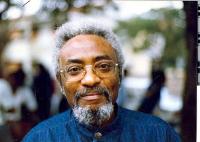 It seems useful to delineate a genealogy of black internationalism as way to understand it's formation. Africa's independencies, beyond the action of africans and africans among the diaspora, take place due to a number of structural shifts. If we place the emergence of african internationalism in a broader perspective it will allow for a understanding of the paradigm changes that took place at the turn of the century.
It seems useful to delineate a genealogy of black internationalism as way to understand it's formation. Africa's independencies, beyond the action of africans and africans among the diaspora, take place due to a number of structural shifts. If we place the emergence of african internationalism in a broader perspective it will allow for a understanding of the paradigm changes that took place at the turn of the century.
To read
15.05.2010 | by António Tomás
 He tells us about the important and complex mission that Amílcar Cabral delegated to them and what it was like to learn the crushing news of his assassination in the middle of this process. It fell to him as his first job to film Amílcar Cabral at an exhibition on the struggle in Conakry, in 1972, and then the transferring of his body to Bissau, capturing the commotion of the Guineans at the death of their greatest thinker and anti-colonial resistance leader.
He tells us about the important and complex mission that Amílcar Cabral delegated to them and what it was like to learn the crushing news of his assassination in the middle of this process. It fell to him as his first job to film Amílcar Cabral at an exhibition on the struggle in Conakry, in 1972, and then the transferring of his body to Bissau, capturing the commotion of the Guineans at the death of their greatest thinker and anti-colonial resistance leader.  This year marks the 50th anniversary of the Portuguese Revolution and the centenary of the birth of one of the most influential leaders of the African decolonization movement. Transatlantically, Cuba played an important part militarily and politically in ejecting the colonizers, while Brazilian educator Paolo Freire was influenced by Cabral’s education for the people. Their ideas are very relevant today.
This year marks the 50th anniversary of the Portuguese Revolution and the centenary of the birth of one of the most influential leaders of the African decolonization movement. Transatlantically, Cuba played an important part militarily and politically in ejecting the colonizers, while Brazilian educator Paolo Freire was influenced by Cabral’s education for the people. Their ideas are very relevant today.
 It is February 1964—one year into the armed struggle for independence in Guinea Bissau against Portuguese colonial rule. Cabral, the independence struggle’s leader, had called a conference in Cassaca for his African Party for the Independence of Guinea and Cape Verde (PAIGC) fighters to re-organize and address inter-party grievances.
The Cabral as seen in this and similar photographs, with his defiant stance, dark glasses, and signature knitted stocking cap in spite of the West African heat, would become the iconic image of the West African country. More than fifty years later, the image is still used to signify both Guinea Bissau’s victory in the 11-year independence struggle and the country’s continued hopes for the future. But what about the faces of the young women surrounding the independence hero? Directly to Cabral’s left in the image stands a round-faced, then 14-year old girl, Joana Gomes.
It is February 1964—one year into the armed struggle for independence in Guinea Bissau against Portuguese colonial rule. Cabral, the independence struggle’s leader, had called a conference in Cassaca for his African Party for the Independence of Guinea and Cape Verde (PAIGC) fighters to re-organize and address inter-party grievances.
The Cabral as seen in this and similar photographs, with his defiant stance, dark glasses, and signature knitted stocking cap in spite of the West African heat, would become the iconic image of the West African country. More than fifty years later, the image is still used to signify both Guinea Bissau’s victory in the 11-year independence struggle and the country’s continued hopes for the future. But what about the faces of the young women surrounding the independence hero? Directly to Cabral’s left in the image stands a round-faced, then 14-year old girl, Joana Gomes.  This article reads Amílcar Cabral’s much under-studied early soil science as a body of work not dissociable from his project of liberation struggle against Portuguese colonialism in Guinea-Bissau and Cape Verde. Drawing on research situated within an artistic practice, the article explores the definitions of soil and erosion that Cabral developed as an agronomist, as well as his reports on colonial land exploitation and analysis of the trade economy, to unearth his double agency as a state soil scientist and as a ‘seeder’ of African liberation.
This article reads Amílcar Cabral’s much under-studied early soil science as a body of work not dissociable from his project of liberation struggle against Portuguese colonialism in Guinea-Bissau and Cape Verde. Drawing on research situated within an artistic practice, the article explores the definitions of soil and erosion that Cabral developed as an agronomist, as well as his reports on colonial land exploitation and analysis of the trade economy, to unearth his double agency as a state soil scientist and as a ‘seeder’ of African liberation.  For many young people today, in Cape Verde, Guinea Bissau, Portugal, France, Brazil, the United States of America, Cabral represents the possibility of criticizing various forms of power, of resistance and of affirming their identities. The ways that Cabral has been taken up confirm that the originality of his praxis lies in its articulation of, and opposition to, different dimensions of domination and violence, from neo-colonialism to gender discrimination.
For many young people today, in Cape Verde, Guinea Bissau, Portugal, France, Brazil, the United States of America, Cabral represents the possibility of criticizing various forms of power, of resistance and of affirming their identities. The ways that Cabral has been taken up confirm that the originality of his praxis lies in its articulation of, and opposition to, different dimensions of domination and violence, from neo-colonialism to gender discrimination.  The book has received critical acclaim as a work by an African writing soberly on “such things”, in “journalistic language, backed by rigorous research.” It is a first in terms of its internal discourse, since it provides us “with a view of an African thinker and fighter from an African perspective."
The book has received critical acclaim as a work by an African writing soberly on “such things”, in “journalistic language, backed by rigorous research.” It is a first in terms of its internal discourse, since it provides us “with a view of an African thinker and fighter from an African perspective."  In fact, to take up arms to dominate a people is, above all, to take up arms to destroy, or at least to neutralize, to paralyze, its cultural life. For, with a strong indigenous cultural life, foreign domination cannot be sure of its perpetuation. At any moment, depending on internal and external factors determining the evolution of the society in question, cultural resistance (indestructible) may take on new forms (political, economic, armed) in order fully to contest foreign domination.
In fact, to take up arms to dominate a people is, above all, to take up arms to destroy, or at least to neutralize, to paralyze, its cultural life. For, with a strong indigenous cultural life, foreign domination cannot be sure of its perpetuation. At any moment, depending on internal and external factors determining the evolution of the society in question, cultural resistance (indestructible) may take on new forms (political, economic, armed) in order fully to contest foreign domination.  It seems useful to delineate a genealogy of black internationalism as way to understand it's formation. Africa's independencies, beyond the action of africans and africans among the diaspora, take place due to a number of structural shifts. If we place the emergence of african internationalism in a broader perspective it will allow for a understanding of the paradigm changes that took place at the turn of the century.
It seems useful to delineate a genealogy of black internationalism as way to understand it's formation. Africa's independencies, beyond the action of africans and africans among the diaspora, take place due to a number of structural shifts. If we place the emergence of african internationalism in a broader perspective it will allow for a understanding of the paradigm changes that took place at the turn of the century. 
